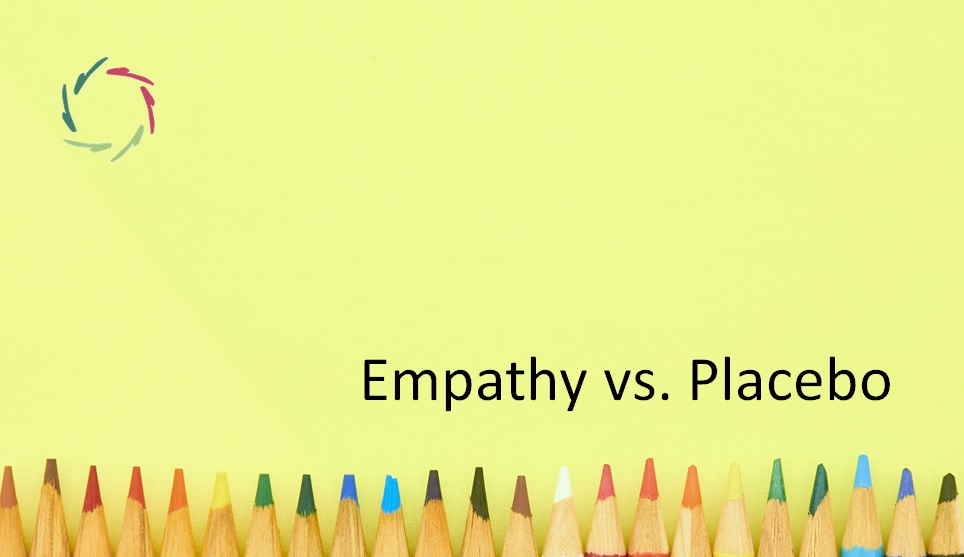Empathy vs. Placebo

As in other cases, how terms are used is of little importance as long as crucial conceptual distinctions are valued.
The landscape of subconceptual communication
Mere consciousness is not the realm of subconceptual communication (SC). [see: “About ‘Subconceptual’”] This is also the case in health-related issues. [see: “Subconceptual Processing in Health and Healing”] A patient cannot by mere conscious decision experience a placebo effect, nor the effect of empathy from a healthcare provider.
It’s also a reason why SC doesn’t always easily get into the spotlights. [see: “No Time to Waste on Subconceptual Processing”]
Yet, SC forms the relevant landscape in this text. Within this landscape, we can see which areas deserve distinction.
A difference in Listening
Note the capital L. I use this because we are playing at a deeper level. [see: “Deep Listening”]
Within this landscape, a crucial difference lies in who is Listening to whom and how. Of course, since it’s communication, there is at least one direction. A speaks; B listens. In this case, B Listens. B may do so with less or more quality. This quality may depend mainly on A or B. Compare it with artful music-playing. If A doesn’t play artfully, B’s appreciation can hardly be qualitative.
SC in healthcare can be one-way or two-way. In the one-way option, there is no Listening to the patient. In the two-way version, there is.
Through two-way Listening, communication becomes deeply interesting.
In terms of mental-neuronal levels, there can be much more overlap. Thus, it also becomes more effective to human growth from the inside out. [see: “Mental Patterns Change through Autosuggestion”]
Also, it shows the patient respect. Where one-way is closed and therefore always needs some kind of untruth (saying the ‘sugar’ is effective), two-way is open and therefore can live and thrive in full truth.
The difference is crucial.
Terminologically
The term ‘placebo’ may be used to denote the whole landscape. But then which term should we use to clarify the above difference? I use the term placebo for the one-way option, empathy for the two-way option. This also seems to be how the terms are generally used.
For instance, the placebo group in double-blind studies does not usually receive more empathy than the other group. The only difference lies in obtaining a placebo vs. verum treatment. The quintessential placebo is the dummy pill ― no empathy in mere sugar or milk powder. Providing a placebo is by itself a one-way communication.
Contrary to this, there may be much empathy in a human encounter. But devoid of deep two-way communication, the caregiver cannot be fully empathic.
Important? Empathy or the lack of it in a caregiving situation may by itself make a huge difference in the outcome. It may be crucial to healing. Since SC can be rather powerful, one-way SC is not without downsides. [see: “Placebo Is Not Good for You“]
Placebo + empathy
Of course, one can administer a placebo with much empathy. Even so, it is a combination of two different things. The same placebo can be administered without empathy.
And, of course, one can have much empathy and administer no placebo.
This also shows the distinction. If not in these terms, it needs to be shown in others.
Psychotherapy: placebo and empathy
Here also, it is crucial to make a distinction between the placebogenic and the empathic influence of the therapist. Instrumental tools can only be placebogenic. This differentiates psychotherapy from psychotherapies. [see: “Psychotherapy vs. Psychotherapies”]
In my view, we should have little placebo (in the sense of this text) and much empathy. Then we can go to empathy-beyond (the conceptual).
Reaching Compassion. [see: “Only Compassion Works”]


